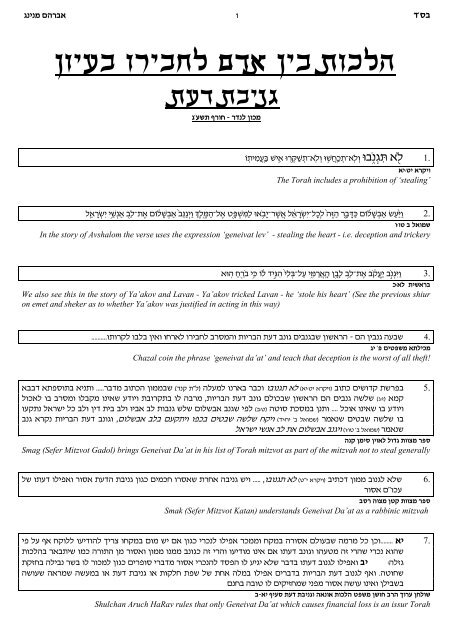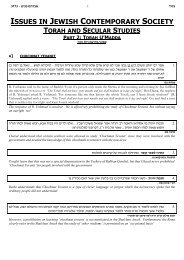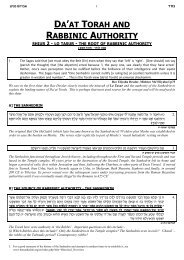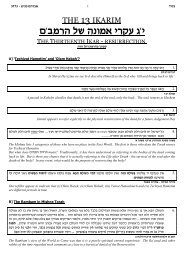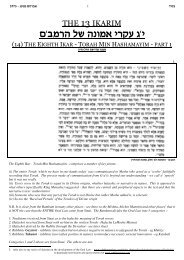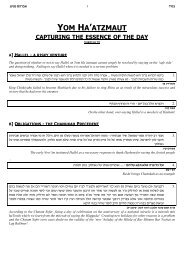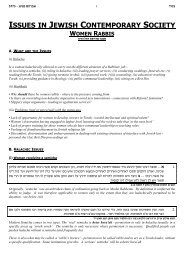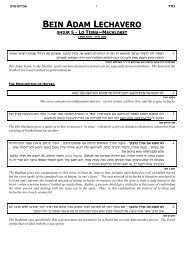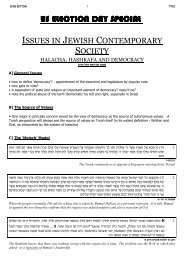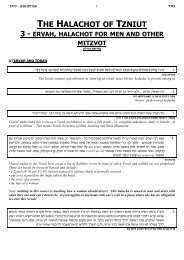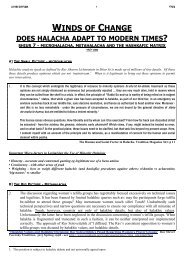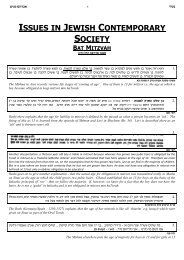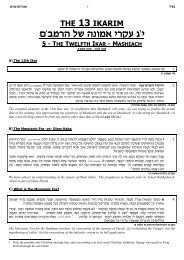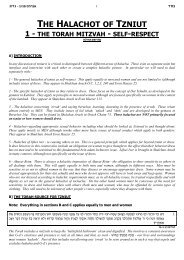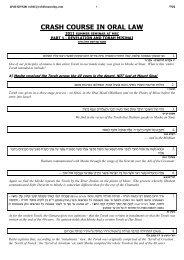Geneivat Da'at - Lander - Rabbi Anthony Manning
Geneivat Da'at - Lander - Rabbi Anthony Manning
Geneivat Da'at - Lander - Rabbi Anthony Manning
You also want an ePaper? Increase the reach of your titles
YUMPU automatically turns print PDFs into web optimized ePapers that Google loves.
dbhbn ovrct1sxciuhgc urhcjk ost ihc ,ufkv,gs ,chbddga, ;ruj - rsbk iufnI ,h ngC Jh¬t UrE J ,t «k u U¬Jjf ,t «k uUc«·bd T t «kth:yh trehuThe Torah includes a prohibition of ‘stealing’1.kt rGh h¬Jb t ck, t oI ºk J c t ÆcBdhu Qk·N vk t yP J Nk Ut«¬chr Jt k ºt rGhkfk ÆvZ v r³c SF oI ¹k J c t Gg¸Hu 2.u:uy c ktunaIn the story of Avshalom the verse uses the expression ‘geneivat lev’ - stealing the heart - i.e. deception and trickerytU v j r«c h¬F I ºk sh´D v Æhk Ckg h·N rtv ick c¬k, t c« ºegh c«´bdHu 3.f:tk ,hatrcWe also see this in the story of Ya’akov and Lavan - Ya’akov tricked Lavan - he ‘stole his heart’ (See the previous shiuron emet and sheker as to whether Ya’akov was justified in acting in this way)//////////u,urek uckc ihtu ujrtk urhcjk crxnvu ,uhrcv ,gs cbud ohcbdca iuatrv - ov ihcbd vgca 4.dh p ohypan t,khfnChazal coin the phrase ‘geneivat da’at’ and teach that deception is the worst of all theft!tccs t,pxu,c thb,u /////rcsn cu,fv iunnca (sbe ,"k) vkgnk ubrtc rcfu ucubd, tk (th:yh trehu) cu,f ohause ,arpc 5.kuftk uc crxnu ukcen ubhta gsuhu ,cure,c uk vcrn ',uhrcv ,gs cbud okufca iuatrv ov ohcbd vaka (d:z) tneuge,b ktrah kf cku ihs ,hc cku uhct ck ,ucbd aka oukact cbda hpk (c:y) vyux ,fxnc ib,u //// kfut ubhta uc gsuhucbd treb ,uhrcv ,gs cbudu 'oukact ckc oge,hu upfc ohyca vaka jehu (sh:jh c ktuna) rntba ohyca vaka ucktrah habt ck ,t oukact cbdhu (u:uy c ktuna) rntbavbe inhx ihutk kusd ,uumn rpxSmag (Sefer Mitzvot Gadol) brings <strong>Geneivat</strong> Da’at in his list of Torah mitzvot as part of the mitzvah not to steal generallyka u,gs ukhptu ruxt ,gsv ,chbd iudf ohnfj urxta ,rjt vchbd ahu ///// 'ucubd, tk (y"h trehu) ch,fs iunn cubdk tka 6.ruxt o"ufgcxr vumn iye ,uumn rpxSmak (Sefer Mitzvot Katan) understands <strong>Geneivat</strong> Da’at as a rabbinic mitzvahhp kg ;t jeukk ughsuvk lhrm ujenc oun ah ot iudf hrfbk ukhpt rfnnu jenc vruxt okugca vnrn kf ifu//////// th 7.,ufkvc rtc,ha unf vru,v in ruxtu iunn ubnn cbudf vz hrvu ughsun ubht ot u,gs cbudu uvgyn vz hrva hrfb tuva,ezjc vkhcb rac uk rufnk iudf ohrpux hrcsn ruxt hrfbvk sxpv uk ghdh tka rcsc u,gs cubdk ukhptu ch :vkzdvauga vtrna vagnc ut ,gs ,chbd ut ,uekj ,pa ka ,jt vknc ukhpt ohrcsc ,uhrcv ,gs cubdk ;tu /vyujaobjc vcuy uk ohehzjna hbpn ruxt vaug ubhtu ikhcacc-th ;hgx ,gs ,chbdu vtbut ,ufkv ypan iauj crv lurg ijkuaShulchan Aruch HaRav rules that only <strong>Geneivat</strong> Da’at which causes financial loss is an issur Torah
dbhbn ovrct2sxcrfhb unuena hbpn vfu,c vabv shda ohcfuf scugk lrh ost jkua whb,n 8.:dm ihkuj vbanThe Mishna in Chulin deals with the question of when it is allowed to sell meat to a non-Jew and says that this is allowedonly if it is clear that the gid hanashe has not been removed i.e. that the meat is not kosher. Q - but why should we care ifhe thinks that it is kosher? Does it make any difference to him? The Gemara starts by suggesting that our concern is thatthe meat may be sold on to a Jew, but goes onto a different explanation .....wr vhv thb, ////// /ohcfuf scug ka u,gs ukhptu ,uhrcv ,gs cubdk ruxt ktuna rnts vh,gsk vhk chbd tes ouan ////// nd 9.tku /kcen ubhta uc gsuhu ,cure,c uk vcrh tku sgux ubhta uc gsuhu ukmt sugxk urhcjk ost cvrxh kt rnut rhtnlpn ina lux uk rnth tku /(obj vcuy uk ehzjvk uck cbuda hbpn - har) ughsuv f"tt hbubjk ,urufnv ,uhcj uk j,ph/vhgsut hgusut !hbubjk ,urufnv ,uhcj uk j,p vsuvh cr hck gkeht tkug tvu ?!hbht /r,un usucf khcac otu 'iehrihdk ushcu kctv ,hck ost lkh tk r", /vhk j,pn hju,p hnb hfv utkcs vsuvh crk vhk chcjs tkug hbta tnht ,hgchtuost rufnh tk r", /(/,uhrcv sucf kusds - har) r,un rhg rcj oa ah otu uvg,na hbpn ohn ubtknh tku aeae,nvurhcjk ost rdah tku /vbfxv hbpn wtu uvg,na hbpn wt - ohrcs wc hbpn vyuja vhj ka kkfc v,n ka ksbx urhcjkuxbfbu ihjrut vhkg inhzu lkvu vhp kg ;m inau ihh ka ,hcj urhcjk rdhaa sjtc vagnu /vhp kg ;m inau ihh ka ,hcjunmg ,t ebju ihh ka thva vtmn/sm - :dm ihkuj trndThe Gemara explains that the concern here is ‘geneivat da’at’ i.e. it would be a deception on our part to allow thenon-Jew to believe that the meat was kosher, even though he can eat any meat that he wants. He may consider koshermeat to be superior and therefore it would be assur to mislead him in this regard. The Gemara gives other examples ofgeneivat da’at:-(i)(ii)(iii)(iv)(v)(vi)pressing someone to come for a meal when you know that will say noopening a new bottle of wine where the guest thinks that you are doing it especially for him, but really you haveto open it anyway.offering things that you don’t really have to people you know will refusewalking into a shiva house with what looks like a bottle of wine but which is really full of waterselling a shoe made of leather which you say is from a shechted healthy animal but which really came from asick animal which diedselling a barrel of oil which is in fact wine with only a thin layer of oil on the topIt is clear that the issur applies to non-Jews too, but why? The passuk says clearly ‘ish beamito’ which sounds like Jewsonly!ucbd, tk ch,fsn ik tepbs vru, ruxht tuva k"z ,upxu,v hkgc oac ubh,ucr ,me uc,f hrfb ka u,gs ,chbd ruxhtu 10.kukhj ihta ouencu 'hte urea, tku uajf, tkst thvv 'hud ygnns u,hngc aht tres tphxc ch,f hfu 'wudu uajf, tku//// ucbd, tkc t,jbt ibhcvhs hnb ubhhvu 'u,hngk ut u,hngn ch,f tks hnb tehsu 'rcsc oav/sm ihkuj t"cyhrv haushjThe Ritva points out that the word ‘amito’ only qualifies the last part of the passuk - one of his proofs is from the notes ofthe passuk. N.B. we see here that the notes are used to interpret mitzvot min haTorah from the pesukim!?!uvk hgyne tvu !hbcz tk /tkhj hbck t,phry kpb tnhku /tkhj hbck trahc kpb ;xuh rc ejmh cr rnt ?ibhzrfn hfhv 11.te uuv trpx cru tcru tzujn hck trfhxn khzte vuv injb crs vhrc tryuz rns tv hf /uvhhapb ugynes tuv uvbhtibt trpx cr k"t !htv hkuf u,tu jurys ibcrk uvk vnk uvk rnt /u,tes tuv vhptk rcx tuv /hssvt ugdp /trfhxk u,tte tvu k"t ?vh,gsk vh,ahkjts hfv vhk ,rnt y"n tcr k"t /ibhjry vuv hpy ibhgsh vuv ht 'rn h,tes ibhgsh vuv tkvhapb hgyn tes tuv uvht !vhk ibhgyn:sm ihkujThe gemara relates various incidents where ‘people are fooling themselves’
dbhbn ovrct3sxcifu vyuja ,ezjc uk rfunc uvgyna hbpn khgk hb,es htvu vraf ht vpry ht hkhhan tks /uvhhapbt ugyn tes tuv uvbht 12.,gs cbud htsus oj,up hbt lkhcac uk rnuts hbubjk ,urufnv ,uhcj j,upvubtmh l,trek uk ubrnt tk ubta hrjt /vhapbt hgyns tuv uvhtoa harRashi’s understanding is that if you say nothing and they jump to conclusions on their own, this would be muttarhbubjk ,urufns vh,gst heuxtk jrutk ihta ouan ruxtu o,xc o,vs vtrb lfk /////// uvhhapbt uvgyn tes uvbht 13.tkt ohtc uhv u,trek tka vh,gst heuxtk vhk hgcht tryuz rnu thv vprys uvhh,gst heuxtk uvk hgcht tfv kctonmg lrumkoa xu,Tosafot rules that sometimes you can be tricking someone by staying silent, if it is reasonable for them to come to theconclusion that they reachrcsv tuv ckca ihbgvu urcf ufu, tkt ckc sjtu vpc sjt vhvh tku hu,hpu ,uekj hrcsc unmg dhvbvk ostk ruxt 14.//////// hrfbv ,gs ukhptu ,uhrcv ,gs cubdk ruxtu vpcau:c ,ugs vru, vban ocnrThe Rambam brings a halacha of ‘echad belev v’echad bepeh’ - a person must be honest and not hypocritical, and hegoes on to talk about geneivat da’at. This is clearly not restricted to money issuesaha gsuh vhv vz rcsc ohua ktrah sjtu ohcfuf scug sjtu o,gs ,t cubdk ut rfnnu jenc ost hbc ,t ,unrk ruxt 15.ruxt ohrcsc ,uhrcv ,gs cubdk ukhptu jeukk ughsuh oun urfnnct:jh vrhfn vru, vban ocnrThe Rambam separately rules the halacha of honesty in business and the obligation to inform a buyer - Jew or non-Jewof any defect in the goods being soldscug tuv ot ;t /jeukk ughsuvk lhrm ujenc oun ah ot iudf 'o,gs cubdk ut rfnnu jenc ost hbc ,unrk ruxt 16.'vaug ubhtu 'ukhcac vauga vtrna 'ohrcsc ,uhrcv ,gs cubdk ;tu /vyuja ,ezjc vkhcb rac uk rufnh tk 'ohcfuf'usucfk ukhcac vauga rcuxa unmg vgynu 'ukhcac vaug ubhta vh,gst heuxtk vhk hgc hts rcs tuv otu //////ruxtughsuvk lhrm iht 'uscfk u,trek tmha vz rucxu lrsc urhcjc gdpa iudfu ;hgx jfr inhx ,ugy jenu vtbut ,ufkv ypan iauj lurg ijkuaThe Shulchan Aruch rules like Tosafot. If a person comes to unreasonable conclusions, they are considered to be‘fooling themselves’ and we have no responsibility for their assumptions////ovn kceh - if hp kg ;t :uk urnt 'hbt jmur :ovk rnth 'uscfk rhgv habt umru yken rhgk vkda jmur 'uc tmuhf ///// 17.j:h ,hghca vbanIf the residents of an city of refuge come out to honour a visitor, he must tell them if he is a murderer. It they still wish tohonour him, so be itofj tbt tkfhn tsj tbt iuk rnhn lhrm hh,r, ihdc vhk ihreun iubhtu r,tk kzt tuvu tkfhn tsj hb,s ab rc 18.d kv oa hnkaurhSimilarly, if people honour someone as a talmid chacham, he must correct them if he is not a great as people think,otherwise it will be geneivat da’at(////// ,gs ,chbdu ohrcsc ukhpt - ubrupx) I º,h ng, t Jh´t ÆUbI, t³ «k u 19.zh:vf trehuThe Torah includes a separate issur of ‘ona’ah’. Seforno on the passuk says that this specifically includes geneivat da’at
dbhbn ovrct4sxcoburfz ubh,ucr urnt /vag tku uhkg cuy rchs ut vcuy ung vag hf rntk urcj ,t vg,na hn - hghcav ekjv spe 20.'hrfbv kzdn r,uh ktrah hnfj kmt runj vzv tyjv vbvu /hrfb ,gs ukhptu ,uhrcv ,gs cubdk ruxt (/sm ihkuj) vfrckapbv hsuxhn tuv hf ',ntv hrsd kg ubchhj,bu 'vcr vnat rea ,pa hf ighcu ighspe hx d rga vbuh ubhcrk vcua, hrgaRabbeinu Yona explains that deception through speech is worse than other theft since it goes to the foundation of the soulvH j J pbk o s t v h vhu ohH j , n Jb uhP t C j PHu v n st v i n rpg o s t v , t ohe«kt v rmhHu 21.z euxp c erp ,hatrcHashem breathed the soul into mantkknn jurk ostc ,uvu hhjs t,nab hvuptc jpbu tgrt in trpg ost ,h ohekt v trcu 22.oa xukebutUnkelos translates this as granting to human beings the power of speechA] Practical Examples1. Quality of Goods • low quality goods for high prices• low quality goods even for low prices - fake NIKE etc.• faulty goods - is it obvious to the buyer?• covering up faults -vs- showing things at their best2. Advertising • false or misleading information• inflated “old price”• “cheapest in town”• “clearance sale”• advertorials• lying about low profits to keep prices high• disclaimers and small print• loss-leaders3. Passive deceit • silence is no defense• selling ‘seconds’ as cheap ‘bests’• selling out of date produce• getting a promotion when you’re planning to resign• enrolling in a school without meaning to stay on4. Promises • ‘if your not totally satisfied, your money back!’5. Gifts • putting expensive labels on cheap gifts• giving second hand gifts as new• collecting for eg teacher and not contributing• adding your name to a present• cheap whisky in expensive bottles• where gift is not from you - but n.b. what if they would prefer not to know• is he fooling himself - ‘flowers from the firm’6. Pressing Invitations • to eat; a ride from the wedding• pressing -vs- politeness7. False Kavod • opening wine ‘especially’• giving someone a ride to the other side of town when you’re going there anyway• leftover drinks from the party• “For you... a special discount!!”• False excuses
dbhbn ovrct5sxc8. Hypocrisy • Pretending to be a tzaddek(et)/ talmid chacham• False greetings - insincerity -vs- politeness• A curse inside a blessing!9. Prying • Lying for the purposes of prying - ‘tell me all about it, maybe I can help..’10. Unfair advantages • Jumping the queue because of an “emergency”11. Cheating • Cheating in tests; n.b. lifnei iver if you help cheaters• forging certificates and qualifications• ‘embellishing’ resumesB] Some (possible) heterim1. For Shalom2. For their Kavod • not intention for your benefit• pressing talmid chacham to come to top table when you know he won’t eat3. Fooling himself? • if common sense tells that it wasn’t done for him; not just distant possibility• giving away a non-kosher bottle of wine to a non-Jew and he thinks it may be kosher• popping in at a wedding when it’s known that you work nearby• selling ‘seconds’ very cheap in a market - no need to say they are ‘seconds’• they jump to false conclusions -‘thank you for davening for me’; inform unless it upsets4. You would do it anywayC] Doing Teshuva• if they have not yet paid you back - inform them• if they have paid you back - ask for mechila• plus normal requirements sh,gk vkce 'hushu 'vyrj 'tyjv ,chzg• even if shogeg - gave a fake bottle of whisky by mistake


